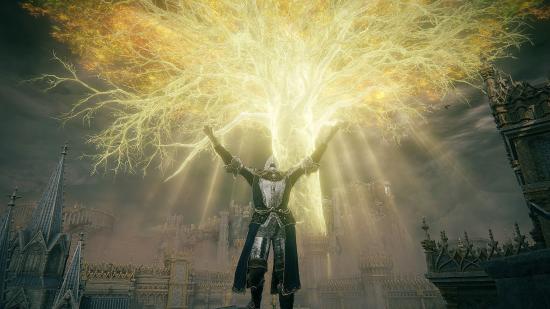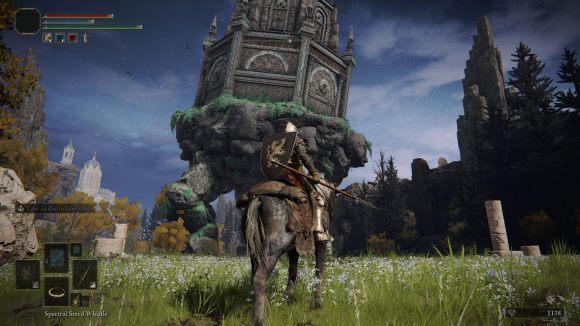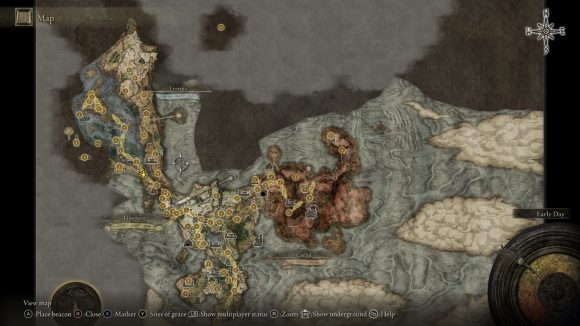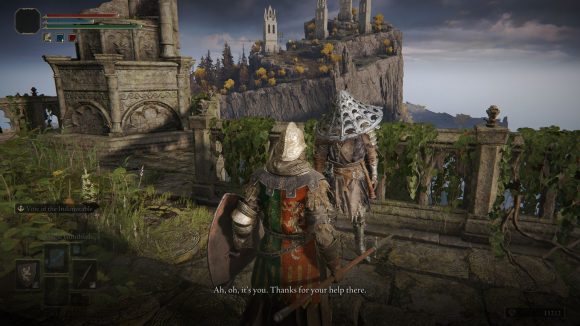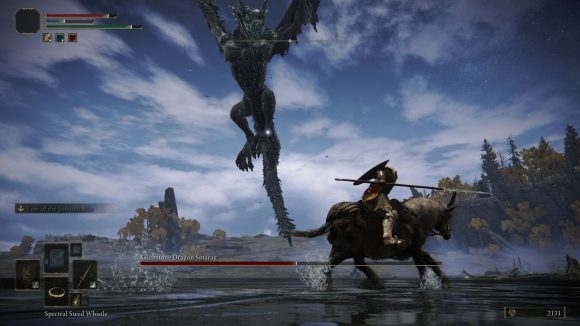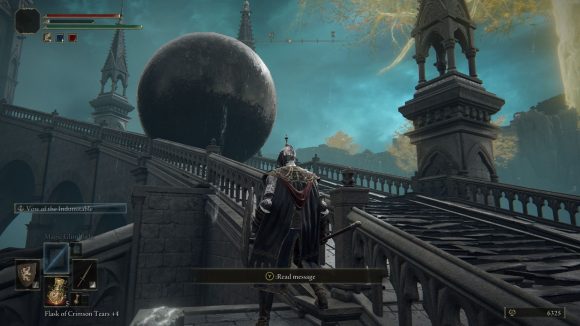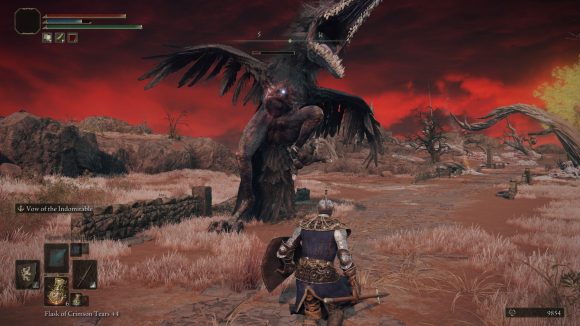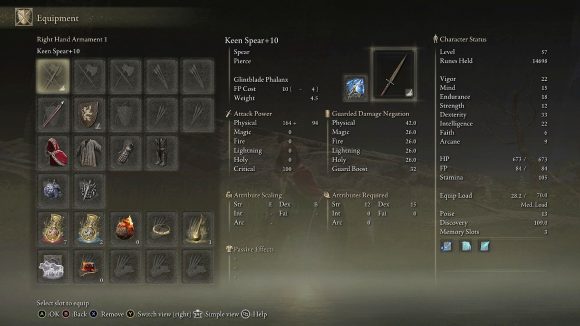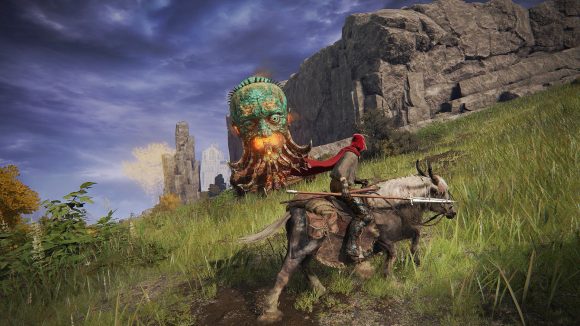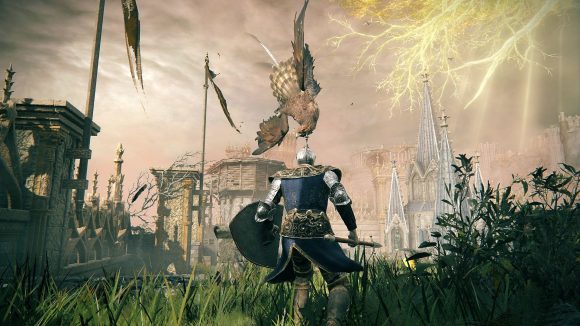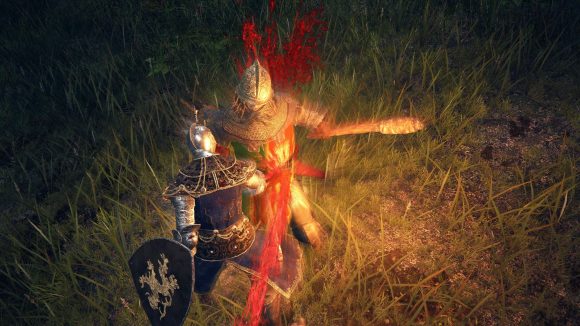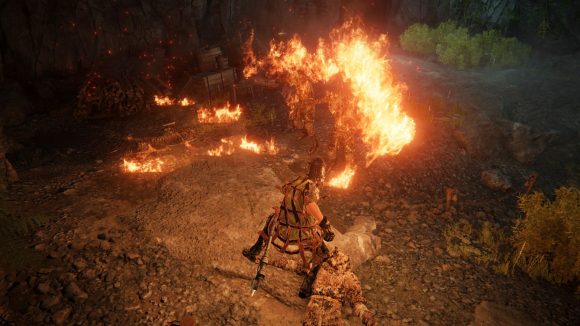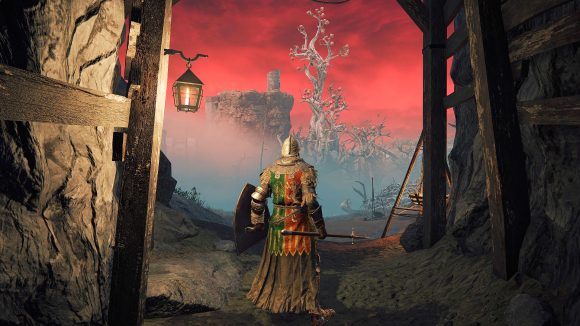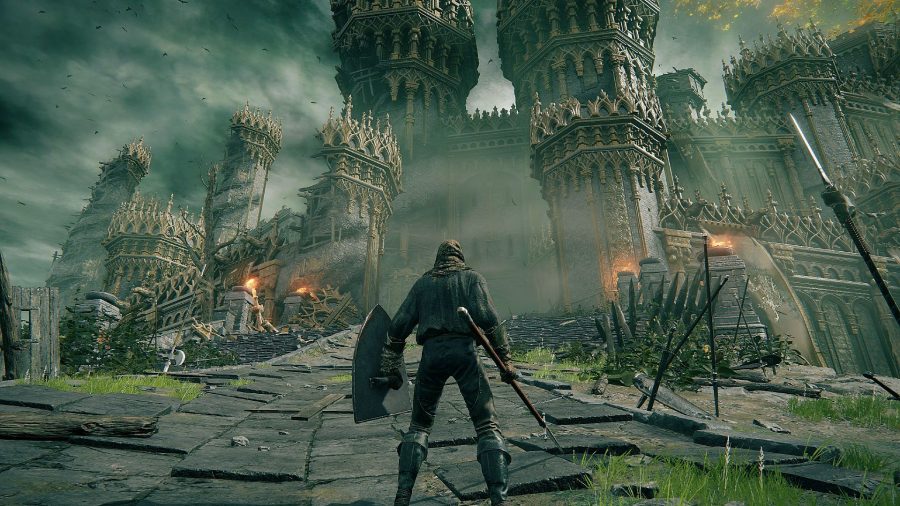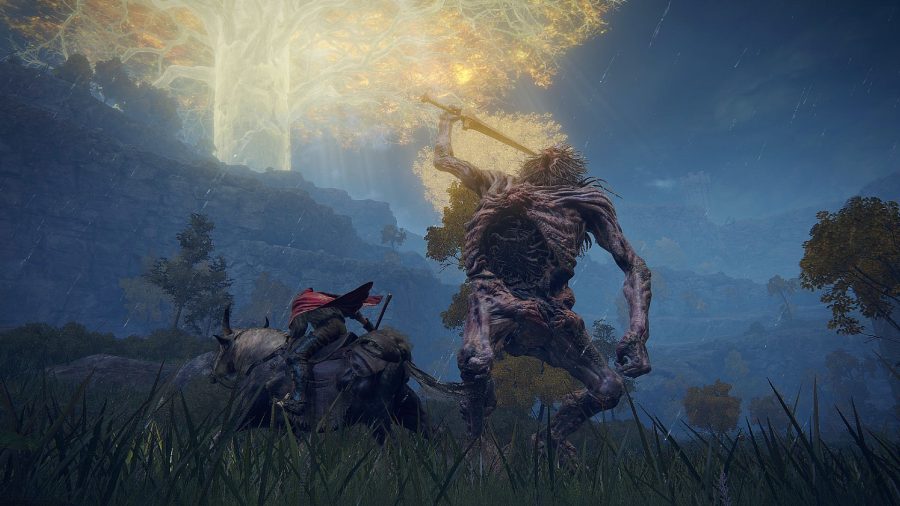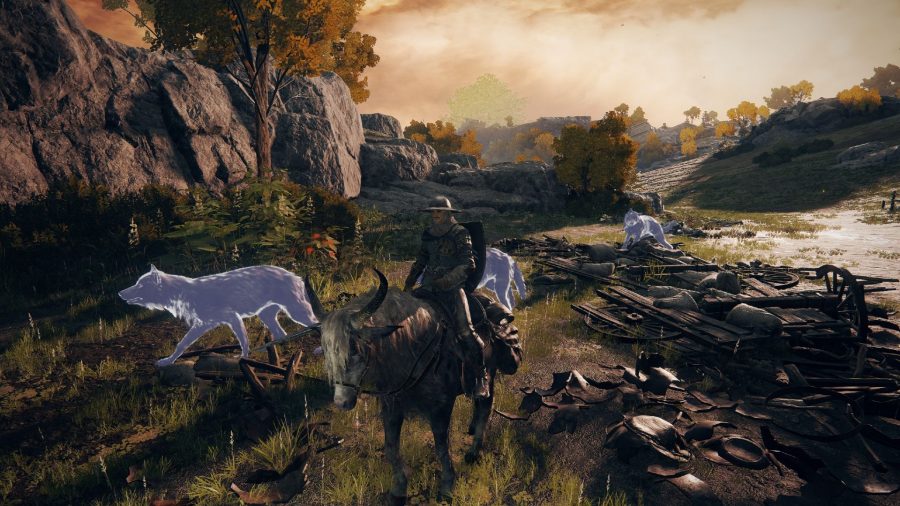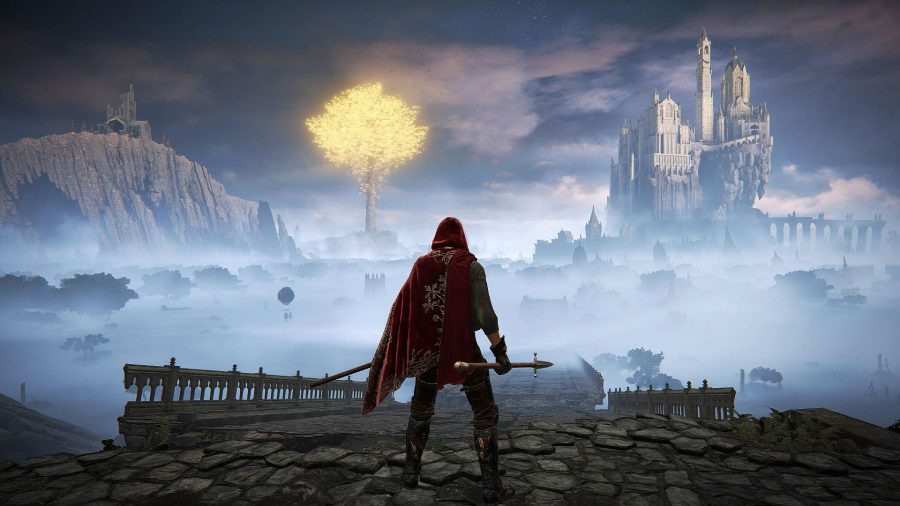Our Verdict
A supercut of FromSoft's very best work, transported to a totally new space. Elden Ring is not only a masterpiece by its developer's lofty standards, but in packing so much density into the Lands Between, it lights the path ahead for open-world games in general.
Elden Ring makes a mockery of words like ‘epic’ and ‘awesome’. Throughout its ‘Soulsborne’ games FromSoftware has revelled in scale: a marble city made for giants, a mountaintop colony of nesting dragons, vast valleys of poison, plague, and defilement, and castles that are almost parodically gothic. In going open world with Elden Ring (which you can buy here, coincidentally), FromSoftware has unlocked its final form, and the result – just like its bosses – will floor you time and time again.
Every new horizon is like a high fantasy painting. You’ll find yourself staring out over a mist-shrouded lake that stretches as far as the eye can see. There’s a glowing erdtree on the horizon, which you can ride to on your spectral steed, Torrent. Flanking the vista are two cliff faces, jutting up from the lake like supersized versions of the Giant’s Causeway – on the right there’s the Academy of Raya Lucaria, a scholarly ivory tower of sorcerers, and on the left there’s a demolished medieval church. You can ride to those places, too.
Dozens of silhouettes break up the view, representing sunken villages, towns, and churches. Pan the camera a little and you’ll spot ruins, sprawling forests, sky-scraping highways, and military encampments. The very best paintings make you wish you could step into them and burrow into each little pocket of detail, and Elden Ring sows that intrigue in every overlook, parapet, and rot-ridden plateau that composes the Lands Between.
And in a ‘have your cake and eat it’ kind of way, this expansiveness hasn’t come at the cost of the tight, intricate level design that makes FromSoft’s past games so great. Out in the open world you’re free to explore and pick fights with roaming enemies however and whenever you like, but you can still find the traditional Souls experience in caves, underground labyrinths, dungeons, and strongholds.
 Elden Ring Elden Ring $59.99 $50.39 Pre-order Network N earns affiliate commission from qualifying sales.
Elden Ring Elden Ring $59.99 $50.39 Pre-order Network N earns affiliate commission from qualifying sales.
Caves only contain a handful of rooms before culminating in a suitably quick boss fight, while fortresses typically see you battling through the courtyard, clearing out the arsenal, scaling the walls, and descending again for a much more challenging boss encounter. You can’t use Torrent in these areas either, limiting your mobility and stopping you from bolting at the first sign of danger.
Legacy dungeons are the pinnacle of these activities. The first, Stormveil Castle, pierces the tempestuous skyline with gilt-edged colonettes, intricate tracery, and row upon row of needle-like spires. You start outside the main gate with a gruelling boss fight against Margit the Fell Omen – a towering warrior who unleashes a relentless barrage of melee attacks – and then skirt the castle walls, fending off giant hawks with katana blades for feet, before creeping through a trap-laden wine cellar and climbing the first of the castle’s many towers. Here you’ll meet the castle guards, who seal their combos with storm blasts that can send you flying off the walls to certain death. Next there’s a banqueting hall patrolled by a spidery creature made from human limbs that have been crudely grafted together. Then there’s a courtyard where you’ll need to carefully lure out a couple of dozen enemies and slay them one by one if you’re to succeed against the ogre at the other end.
Final boss Godrick the Grafted caps this multi-hour dungeon. It’s one of the toughest fights I’ve played in a FromSoft game to date, and at first I tell myself that I simply won’t be able to put a dent in Godrick’s health bar unless I return to the open world to over-level. Another few attempts go by and I get a little closer, only to have Godrick begin a second phase by tearing the head off a dragon and fusing it to his arm. Unaware of what to expect, I can only watch as the dragon-arm snatches me up and burns me alive. After another handful of attempts I can reliably get Godrick down to his last sliver of health, but surviving for long enough to land those last few crucial hits feels like being asked to go a round with prime Mike Tyson. But eventually, it all clicks into place, and the perfect run materialises like gold from air. I’m still making mistakes and taking avoidable damage, but the big hits – those seven-string combos that catch me mid-dodge or wipe out my stamina entirely, are readable now – and I slay Godrick in his own keep.
I include this lengthy anecdote from Stormveil Castle to assure FromSoft veterans that you can still find slices of Dark Souls in Elden Ring, and if you stacked the latter’s legacy dungeons against even the very best areas from the Souls trilogy it would be hard to pick a winner.
Finishing a legacy dungeon opens another stretch of the open world to explore. While every area is connected, there are a few distinct regions that boast their own enemy types, ecosystems, and loot. Limgrove, the starting area, is all wind-blasted meadows, barbarians, and giants, but lilac-hued Liurnia of the Lakes is dominated by arcane creatures and crustaceans. At one point I venture too close to a lobster the size of a bus and it snaps around and grabs me with one claw, before repeatedly pinching at my skull with the other. There’s a clear main path through the whole game – signalled by golden streams of light that point you to the next resting place – but there are huge swathes of the Lands Between that you’re never pushed to explore.
Torrent lets you cast a wide net . Thanks to his speed you can pass through most of the overworld without taking a single hit, so you can uncover new fast travel points with ease, and from there you can start picking through ruins for treasure and fights. After 40 hours there are still zones I’ve never set foot in or only glimpsed from horseback as I gallop past. Whenever I’ve delved deeper, I’ve been rewarded with NPC quests, unique loot, rare resources, permanent character upgrades, and boss fights. There may not be any ‘conventional’ open-world activities in Elden Ring – it’s a far cry, so to speak, from Ubisoft’s well-worn approach to this genre – but FromSoft has created a setting that always rewards exploration.
Your horse isn’t just a means of getting around safely, and there are a few battles in which Torrent’s mobility is integral to victory. You can canter along at a steady pace, which is great for chipping away at mobs like wolves and soldiers, but for giants and dragons you’ll need to carefully time galloping charges and leaps in order to avoid their attacks and land some of your own. Horseback battles are nowhere near as complex or nuanced as those on foot, but they are among the most spectacular showdowns I’ve ever played. Steering between the legs of a giant knight, glancing spear blows off its ankles as it sweeps a hundred-foot halberd halfway across a valley, is like nothing else in videogames; and it’s not even a boss fight. Fights against dragons, which have been something of an Achilles’ heel for FromSoft in the past, are similarly awesome, and the extra space and mobility afforded by the open world has made these into standout moments.
On foot, combat feels closest to Dark Souls III in terms of pace and build variety, but there are small influences from Sekiro in the form of stealth movement and jumping attacks. A new guard counter lets you follow a block with a fast and powerful attack of your own, and it makes many fights a little too easy, but there’s a catch in that you’ll be in range of your enemy if you wipe out your stamina bar. All of the new moves are supplementary – stealth will help you clear out the odd bandit camp, and a couple of hard-hitting jump attacks might be enough to stagger an early boss, but the core of combat will be familiar to any Souls players.
Ashes of War are new items that you can tie to weapons and shields, adding effects that range from temporary stat buffs and weapon imbuements to powerful spells and unique attacks. I’ve added storm stomps to shields that can stagger low-level enemies, turned my spear into a spinning wheel of death, buffed a sword with holy damage, and deflected magic back at enemy wizards with well-timed spell parry. There are dozens of these in Elden Ring, and they’re yet another example of the game’s malleability, effectively letting you take a weapon art from Dark Souls III and apply any vaguely similar weapon in your arsenal.
This level of flexibility extends all the way through Elden Ring’s character customisation, too. As in Dark Souls III you can distribute FP and HP flasks to suit your build; equip a variety of talismans (which act just like rings from the Souls trilogy) with either universal character buffs or boons to specific attacks and weapon types; weapons can be upgraded to +25 and aligned to 11 different affinities; there’s a special flask you can customise with two different effects; and you can summon a variety of different spirit animals and NPCs to aid you in certain locations.
Those summons will seem a little overpowered at times – a pack of wolves I unlock early on lets me tear through some of Limgrove’s most congested areas without much hassle – but they’re only ever a temporary helping hand. In my fight against Godrick I let my summon take his aggro just for a quick respite, so I could reapply weapon buffs, heal up, and go again. Godrick killed it too quickly for much else. And while it does undercut some tension when you’re able to match a mob of enemies with a spectral crew of your own, the sheer theatre of the resulting brawl – bigger and more chaotic than any fight in Souls – is too good to resist.
The items menu has been massively expanded as well, and is complemented by the ability to craft items with resources you collect throughout the open world. Some ingredients only grow in specific areas, and on a few occasions I found myself returning to the same corner of the Lands Between to replenish a stock of Fire Grease so I could head into a boss arena with a blazing great axe in my hands, or better stamina regen, or a pocket full of throwing knives.
Crafting and summons represent probably my favourite change in Elden Ring: it’s less obnoxious than its predecessors. Without wanting to provoke another wearying discussion about difficulty, or muddy the waters of vital questions about accessibility, Elden Ring is easily the most approachable FromSoft game I’ve played. Your character sheet is crystal clear about what your strengths and weaknesses are, item descriptions aren’t needlessly obscured with esoteric lore snippets, and tutorial prompts explain every core mechanic in the game. Having the freedom to roam the world and go into your next battle with a stuffed inventory of consumables, all without having to grind for souls you’d rather spend on leveling up, is so refreshing.
This is especially true of the story and questing. I’ve always struggled to make head or tail of the major plot beats in Souls games, rarely knowing who I should speak to when I run out of obvious ways to progress the story, and I’ve completed NPC quests through luck rather than understanding the steps I need to take next. Elden Ring doesn’t spell it out for you with quest logs or journal entries, but there’s just enough clarity in dialogue that I was always able to figure out what to do.
And because it’s that tiny bit easier to unpick, Elden Ring has wormed its way deep inside my head. I can’t stop thinking about it and I want to talk about it endlessly. There’s something to pore over in every nook and cranny of the world. I want to talk about how it has a genuinely laugh-out-loud Dark Souls easter egg, about its apparent obsession with baby birds and embryos, or about how I learned all my most powerful spells from a giant tortoise wearing a pope hat. I’ve found more special items and mysteries in a few hours of Elden Ring than in all the bloated runtimes of Assassin’s Creed.
 Elden Ring Elden Ring $59.99 $50.39 Pre-order Network N earns affiliate commission from qualifying sales.
Elden Ring Elden Ring $59.99 $50.39 Pre-order Network N earns affiliate commission from qualifying sales.
